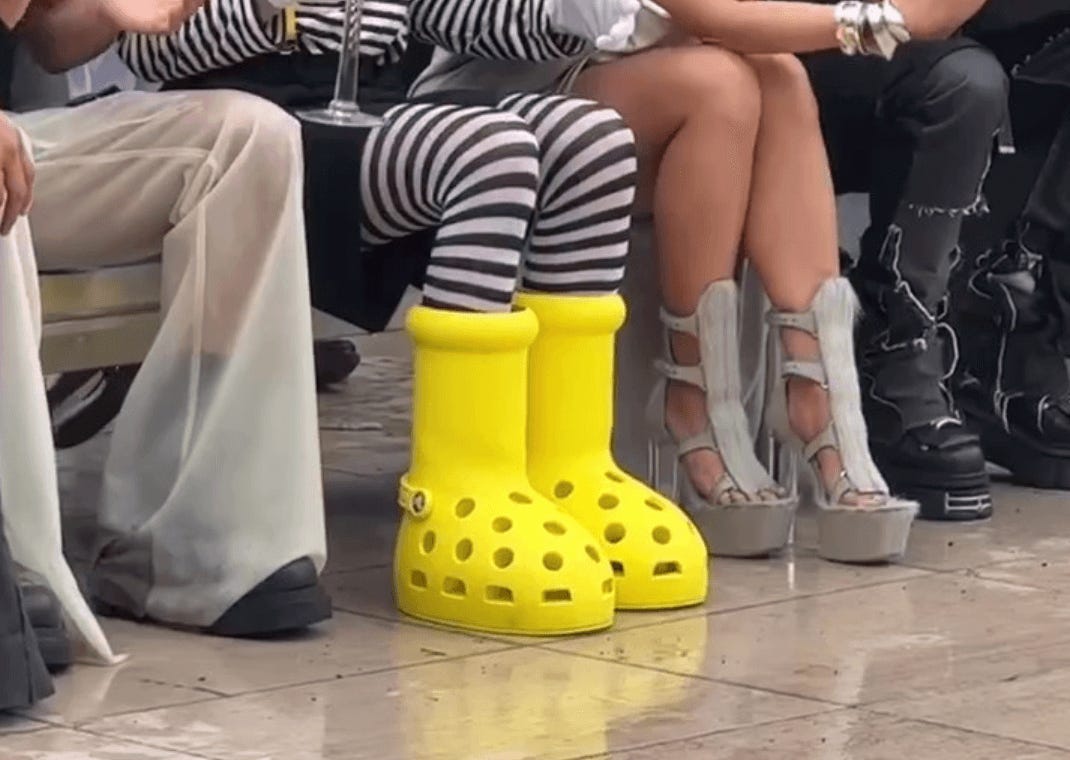There is a solid argument to be made that running has only become interesting to me since the swelling popularity and availability of podcasts. At the very least, they help motivate on those biting winter days in Northern Europe — like today’s — where I have absolutely no desire to lace them up.
I will, later on. Definitely. Be sure to check back.
But for now, I wanted to share something before the year 24 turns to 25 and I need to think of another episode for this list.
All of these episodes gripped me in some way. Sometimes it was the questions of the interviewer; sometimes, the subject’s skill at weaving their narrative; and sometimes it was simply one episode out of an entire series that I thought well reported and designed.
On my phone, there are more than a few hastily recorded voice notes to myself, mid-run, inspired by ideas, thoughts, and quotes from these episodes. They reveal a man almost out of breath, panting heavily. They are not good listening.
These are. There is, hopefully, a decent amount of variety. I get annoyed with hosts’ voices quickly — sorry, Peter Kafka, or Kara Swisher — so I dip in and out of podcasts and series. I arrive at these mostly through reading. Podcast discovery has been an industry-wide problem for more than a decade. And it has yet to be solved.
Still, you used to have to look up a bunch of articles to piece together the profile of somebody. Now you can listen to them speak for an hour and learn a lot.
Here we go. Happy New Year.
#1 The magic of curation.
I got to spend an evening peppering all-world music curator Gilles Peterson with questions in a DTLA restaurant a few years ago. The voracious appetite and analog + digital approach that enables him to stay ahead of the cultural curve is shared perhaps only by ... Questlove, who conducted this excellent interview with him.
#2 What good design means.
Paula Scher’s design work has touched all of our lives, whether we’re cognizant of it or not. Active since the early 1970s, she’s done album covers, branding systems for major companies and continues to be relevant today. Rick Rubin takes her on a good journey here.
#3 When brand storytelling isn’t enough.
A well executed deep-dive into the wild world created by the 1990s team working on one of Coca-Cola’s big misses, the beverage brand OK. An fun, yet instructive take on when you win with brand story, only to lose with product.
#4 How to write gripping nonfiction.
Say Nothing, about the IRA and the Troubles, is one of the best nonfiction works of journalism you will ever read and it’s probably not very close. Patrick Radden Keefe is fantastic to listen to, and this interview is no exception.
#5 The magic of sound design.
A bit of a sound nerd, I love the Sound School Podcast for what it teaches me about the medium (and it’s good for new podcast discovery). But I think this tribute to Nova Scotian documentarian and sound artist Chris Brookes crosses into must-listen territory.
#6 The excitement in the creative process.
Being interviewed by Debbie Millman must feel like settling into an Eames chair. If there are moments of discomfort, trust that Debbie will have researched them and thought about how to ask you about them in a kind, intentional way. This interview with former New York editor Adam Moss is no exception, and great if you’re interested in the creative process, which Moss is obsessed with.
#7 A wonderful shopkeeper in Cairo.
This Business of Fashion interview with the cultural philosopher behind one of Cairo’s most innovative retail concepts expanded my world view in one episode. And he drops a beautiful Rumi quote. Use it in your next contentious meeting.
#8 The thing about nostalgia.
Hua Hsu wrote a lovely book (Stay True) a few years ago on the loss of a friend at the very moment friends meant the most to him. In this interview, he talks about balancing memory against nostalgia, and his work as a New Yorker music critic.
#9 All-consuming love, and obsession.
If you knew about Heavyweight, you were a proper podcast aficionado. I didn’t, but this episode unraveling the obsession between painter Victor Rodriguez and his lifetime muse (and ex-wife) is a marquee example of its storytelling prowess.
#10 The end of a founder’s journey.
These two interviewers aren’t top shelf, but this guest’s journey is. Friend-of-the-letter and friend Damian Bradfield’s reflection on growing WeTransfer from a Dutch file sharing service into a beloved global brand, and the conflict within him now that it’s been sold.
#11 An MF Doom primer.
One of hip-hop’s poet laureates, the late MF Doom was a complex man who dealt with more than his fair share of tragedy. This podcast, thanks to friend-of-the-letter Jorge Woolley, explores his biography through his mesmerizing wordplay and stage craft.
#12 Learn more about doing nothing.
I think a lot about overstimulation and the vanishing ability to do nothing. The book is from a few years ago, but this conversation with Jenny Odell felt very contemporary.
#13 Buildings, materials, us.
Bjarke Ingels is perhaps the world’s most prominent architect and he has a magical way of talking about buildings, materials, and how they shape humanity. I listened to both parts of this interview. Twice. A double double.
#14 An unconventional narrative.
I love nothing more than unconventional narratives. And Ian Rogers’s path from Midwestern punk aficionado to the Beastie Boys’ first web master, to the corporate heights at Apple, LVMH, and the bitcoin hardware company Ledger has more than a few lessons from his pivots along the way.
#15 A graphic design primer.
A legend in the graphic design game and if you’re less schooled in that area (like me), this interview with Neville Brody is a great primer. His hard-earned perspective also shines: finding similarity in the engineering-dominated paradigm faced by designers at the end of the 19th century and today.
#16 Running brands have never been more interesting.
Former Red Bull colleague Aaron Lutze and ultra-runner Dylan Bowman pull off an admirable feat each week: a survey of brand building in the outdoor industry that feels authoritative but never loses its sense of curiosity and discovery. This episode takes a look at an energized running industry, where brands from Bandit to Satisfy, to HOKA are taking aim at the giants.
#17 The magic in MSCHF.
If you don’t yet know the New York city provocateurs, this is an excellent primer. I love how they subvert platforms and capture attention in the most unpredictable way (Jesus Air Maxes, Auctioning off a cow … ). This episode of a podcast I don’t normally listen to catches founder Gabe Whaley at a crossroads.
#18 JK Rowling in crisis.
If all you know of JK Rowling recently are clickbait headlines of her anti-trans stance, this episode provides the necessary context. The host’s compelling backstory encourages the Harry Potter author out into her first interview on the subject. She’s eloquent and thoughtful, but so are the trans activists interviewed later in the series. Excellent reporting, excellent perspective.
#19 Making the most of a Banksy obsession.
Told from the POV of a superfan who discovers the wrinkles in the starched image of his hero, the sheer personality of host James Peak and his back-and-forth with soundman Duncan make for entertaining listening.
#20 The problem with AI and Artistry.
From Mozilla’s IRL, a podcast that tackles a different subject every season this episode on artists embracing — and shirking from — the technology destined to change the creative act, gives a clear picture of the opportunities and challenges. Especially poignant, how the advent of AI-generated lyrics might damage the validity of the Black experience.
#21 What having taste actually means.
I really wanted to like his book, Status & Culture, and his dive into the objects and attitudes that create culture. But W. David Marx is not as easy a writer as he is a podcast guest, where his stories of moving to Japan at a young age and his eloquence on our obsession with status makes for compelling listening.
#22 Thinking about Earth.
Stewart Brand helped feed the 1960s counterculture with his publication The Whole Earth Catalog: a wonderful grab bag of advice on everything from how to build a geodesic dome, to spot welding, to what to do in a drug bust. He foretold the digital utopianism that drove us to today, and he’s as curious and engaging a conversation partner as ever.
#23 Killer Mike’s Atlanta.
One half of hip-hop super-duo Run the Jewels, Killer Mike is among the most interesting and compelling voices in culture. His recollection of the Atlanta he grew up in is what stuck with me from this one.
#24 On Time and Water.
I don’t know how often I bring up this book and its author, Andri Snær Magnason. But it’s often. It’s an Icelander’s meditation on climate change, told through his daughter and grandparents and a changing glacier. And this interview with him is what moved me to buy it. I return to it every few months or so, because it’s hopeful.








